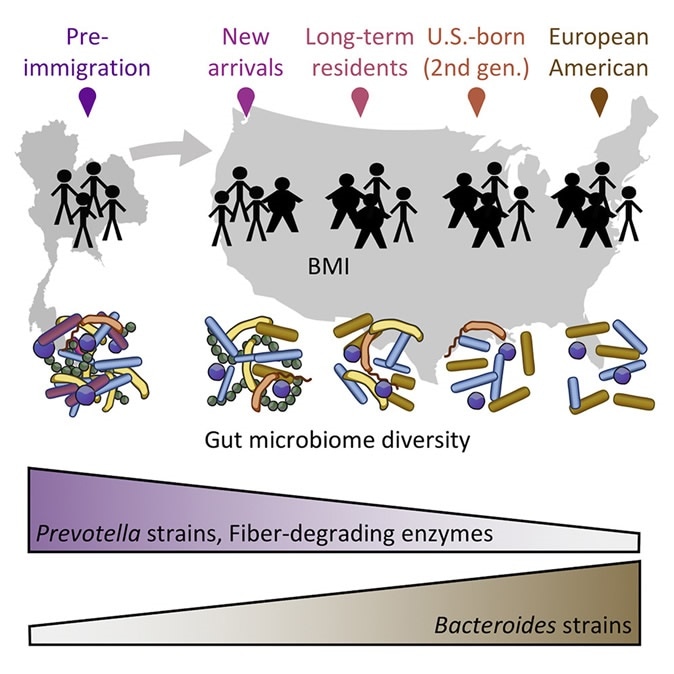
Migration affects gut microbiota which in turn affects health find researchers
Human gut contains trillions of helpful and friendly bacteria that makes up the microbiome. These microbes are found to be greatly influential of human conditions including general health to mental health.
These bacteria get a hold of the infant gut at birth and during breastfeeding and with time it undergoes a change. Researchers have found now that moving from one location to another can also influence gut microbiome and thus affect health.
According to a new study published in the journal Cell, immigration plays an important role in changing the microbiota of the human gut. The team of researchers looked at several generations of individuals from Southeast Asia to the United States.
Results revealed that the diversity of microbes in the gut of these individuals reduced as they continued to live in the US for generations. This change resulted in their gut microbiome becoming similar to the European Americans.
Decline in microbiome diversity (diversity of the microbiome means variety of gut bacteria) is directly linked to health and more varied gut microbiome usually translates to better health. With decline in the gut microbiota there was an increase in rates of obesity.

US Immigration Westernizes the Human Gut Microbiome. Image Credit: Cell
Dan Knights, a computational microbiologist at the University of Minnesota and co-author of this study said that moving to a new country changes the microbiome as detected in this study. He explained that the microbiome is adapted to the bacteria in the new country and the risks of infections present there. He explained that immigrants moved to a new country like the US and their diets contained more amounts of fats, sugars and proteins which caused heir microbiota to change within a few months of the move. He explained, “People began to lose their native microbes almost immediately after arriving in the U.S. The loss of diversity was quite pronounced: Just coming to the USA, just living in the USA, was associated with a loss of about 15 percent of microbiome diversity.” He added that the children of these immigrants had a further 10 percent loss of their gut diversity. With this decrease, there was a rise in rates of obesity and diabetes. Knights added that people living in developing nations tend to have more gut microbiome diversity and possibly less risk of metabolic diseases such as high blood pressure and diabetes. Knights explained that it was known that moving to the US from a developing nation increases the risk of metabolic diseases. This is the first study that makes the connection between this heightened risk and the alteration of the gut microbes.
According to Knights and other experts, it is not just diet that changes the microbial environment of the immigrant guts. There are a host of other factors that alter the microbiome include increased usage of antibiotics and alteration of drinking water.
For this study the team of researchers looked at stool samples of over 500 women who belonged to two ethnic groups of Asia – the Hmong and Karen people. These individuals were immigrants to Minnesota. Men were not included in the study because a large majority of immigrants to the place were women. Some of the participants lived in Thailand while the others were first and second generation immigrants to the US. Among the participant samples 19 were from Karen women before they departed from their native countries and after their arrival. These samples were compared with the microbiome of 36 European Americans who were born in the US.
Results showed that the dominant species of the gut bacteria was Prevotella in the women and it changed to Bacteroides. The former species is more important for digestion of fibrous foods that are consumed more in Asia compared to the US. These women in Thailand ate a diet rich in coconuts, palm, tamarind and the bulbous part of a plant konjac as a major part of their diet. This changed when they immigrated.
Researchers explain that the diet change leads to obesity and the microbiome changes accordingly and it is not because of the microbiota change that obesity occurs. According to Knights adoption of Westernized lifestyle elsewhere can also cause similar changes in health. He added, “Because we were able to confirm the same findings in two different ethnic groups, we expect that we would see something similar happening in the other immigrant groups.” These would be proved in further studies he said.






















.png)












No hay comentarios:
Publicar un comentario